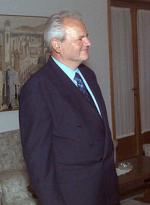Disable ads!
Slobodan Milosevic
Slobodan Milošević (pronounced [slɔbɔ dan milɔ ːʃɛʋit ɕ] ( listen); Serbian Cyrillic: Слободан Милошевић; 20 August 1941 – 11 March 2006) was a Serbian and Yugoslav politician who was the President of Serbia (originally the Socialist Republic of Serbia, a constituent republic within the Socialist Federal Republic of Yugoslavia) from 1989 to 1997 and President of the Federal Republic of Yugoslavia from 1997 to 2000. Among his supporters, Milošević was known by the nickname of "Sloba". He also led the Socialist Party of Serbia from its foundation in 1990. He rose to power as Serbian President after he and his supporters claimed need to reform the 1974 Constitution of Yugoslavia due to alleged marginalization of Serbia and political incapacity for Serbia to deter Albanian separatist unrest in the province of Kosovo due to the high level of autonomy granted to the government in Kosovo that was claimed to have separatist sympathies and tolerating Albanian nationalists persecuting Serbs in Kosovo. His presidency of Serbia and the Federal Republic of Yugoslavia was marked by several major reforms to Serbia's constitution in the 1980s to the 1990s that reduced the powers of the autonomous provinces in Serbia and in 1990 transitioned Serbia from a Marxist-Leninist single-party system to a multi-party system, attempted reforms to the 1974 Constitution of Yugoslavia, the breakup of Yugoslavia and the outbreak of the subsequent Yugoslav Wars, the founding of the Federal Republic of Yugoslavia by the former SFRY republics of Serbia and Montenegro, negotiating the Dayton Agreement on behalf of the Bosnian Serbs that ended the Bosnian War in 1995, and his overthrow in 2000. In the midst of the NATO bombing of Yugoslavia in 1999, Milošević was charged by the International Criminal Tribunal for the former Yugoslavia (ICTY) with war crimes including genocide, and crimes against humanity in connection to the wars in Bosnia, Croatia and Kosovo. Milošević resigned the Yugoslav presidency amid demonstrations, following the disputed presidential election of 24 September 2000. He was arrested by Yugoslav federal authorities on 31 March 2001 on suspicion of corruption, abuse of power, and embezzlement. The initial investigation into Milošević faltered for lack of evidence, prompting the Serbian Prime Minister Zoran Đinđić to extradite him to the International Criminal Tribunal for the former Yugoslavia (ICTY) to stand trial for charges of war crimes instead. At the outset of the trial Milošević denounced the Tribunal as illegal because it had not been established with the consent of the United Nations General Assembly; therefore he refused to appoint counsel for his defence. Milošević conducted his own defense in the five-year-long trial, which ended without a verdict when he died in his prison cell in The Hague on 11 March 2006. Milošević, who suffered from heart ailments and hypertension, died of a heart attack. The Tribunal denied any responsibility for Milošević's death, and stated that he had refused to take prescribed medicines and medicated himself instead. In February 2007, the International Court of Justice (ICJ) ruled separately in the Bosnian Genocide Case that there was no evidence linking Serbia and Milošević to genocide committed by Bosnian Serbs in the Bosnian war. However, the Court did find that Milošević and others in Serbia had committed a breach of the Genocide Convention by failing to prevent the genocide from occurring and for not cooperating with the ICTY in punishing the perpetrators of the genocide, in particular General Ratko Mladić, and for violating its obligation to comply with the provisional measures ordered by the Court.
 Read more on wikipedia.org Read more on wikipedia.org
 All quotes by Slobodan Milosevic All quotes by Slobodan Milosevic
 Edit Edit
|

|
|
|
|
|
Background photo by Giuliana
|